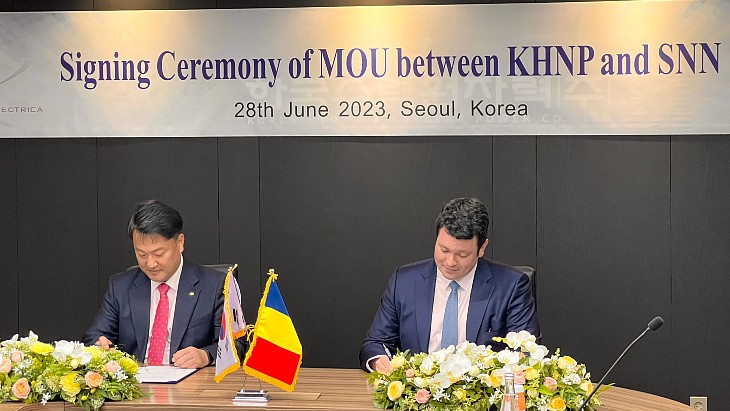
The memorandum of understanding records the intention of the parties to "collaborate for studying, planning and development of activities for technical uranium concentrates processing, with the purpose of potentially qualifying SNN (Nuclearelectrica) as a potential supplier of sinterable UO2 powder by KHNP, and the exploration of possibilities for collaboration in the area of nuclear fuel bundle fabrication".
Cosmin Ghita, Nuclearelectrica CEO, said: "In December 2022, Nuclearelectrica completed the acquisition of certain assets in the technical uranium concentrate processing flow from CNU Feldioara Branch. The strategic decision to acquire part of the Feldioara branch was aimed at preserving and developing the integrated Romanian nuclear fuel cycle and ensure the resilience of the production capacities of Nuclearelectrica. In the context of expanding the production of Cernavoda NPP with two more units ... it was crucial for us to ensure the security of production of fuel bundles and the optimal operation of FCN Pitești and Cernavoda NPP.
"By cooperating with highly experienced partners such as KHNP, we want to further develop our fuel management and production capabilities and be able to export our services. The implementation of this MoU gives us long-term strength and security and I thank KHNP for taking our already consolidated partnership to a next level of excellence."
KHNP owns and operates CANDU reactors in South Korea and Nuclearelectrica noted that this meant it "has technical knowledge and experience in the production of advanced" CANDU fuel bundles as well as being "interested in diversifying its source of uranium dioxide powder".
Nuclearlectrica's Ghita added: "We aim at becoming a fully integrated, fully resilient, fully innovative nuclear producer and a reference point in the region."
The MoU comes the day after KHNP signed a contract worth KRW260 billion (USD200 million) to construct a tritium removal facility at Nuclearelectrica's Cernavoda nuclear power plant site.
Cernavoda is the only nuclear power plant in Romania and consists of two 650 MWe pressurised heavy-water reactors. Unit 1 went into commercial operation in 1996 and unit 2 in 2007. Operator Nuclearelectrica plans to extend the operating life of unit 1 to 60 years. Most of the work on units 3 and 4 - like units 1 and 2, CANDU-6 reactors - was done in the 1980s prior to the fall of the government of Nicolae Ceausescu in 1989. Work is now on-going to construct units 3 and 4, with scheduled commercial operation in 2030 and 2031.